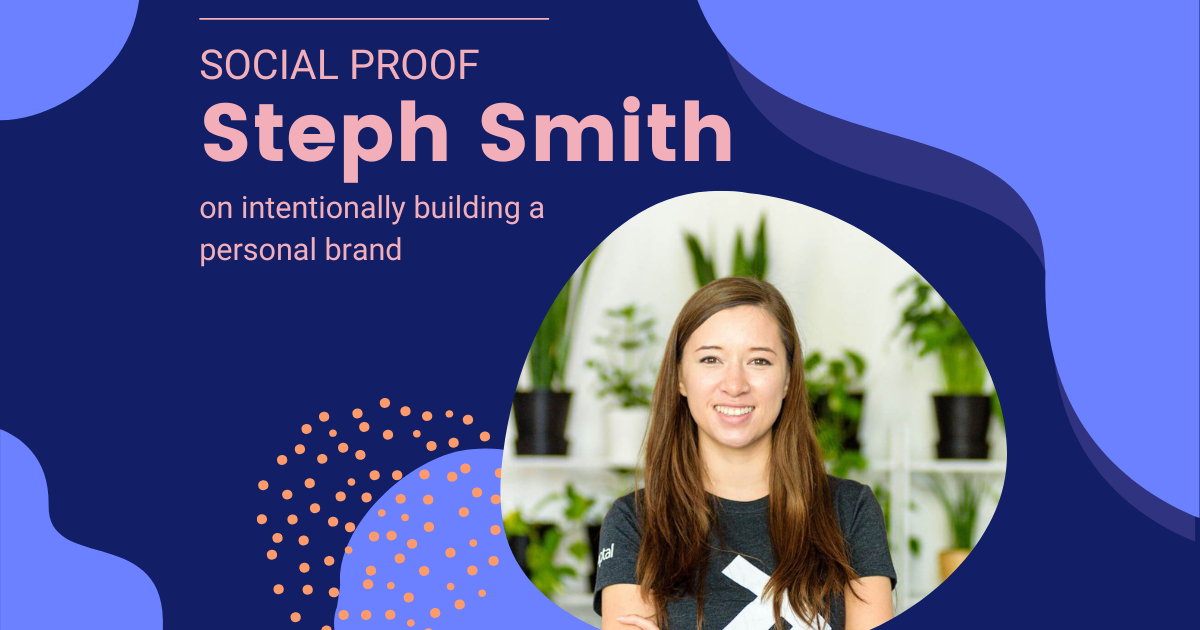
Social Proof: Steph Smith on Intentionally Building a Personal Brand
In the second edition of Social Proof, Steph walks through her experience with intentionally building a personal brand.

Content Writer @ Buffer
What is Social Proof?
Social Proof is a series chronicling how ambitious individuals intentionally craft and grow their personal brands to inspire anyone hoping to do the same. Social Proof has a double meaning — ‘to replicate the actions of others to get similar results’ and ‘to showcase the power of social media in growing a personal brand’. We hope to bring to light insights that can help you bring both meanings to life for your personal brand.
For the second edition of Social Proof, we interview one of the prime examples of crafting a personal brand — Steph Smith.
Steph Smith is a multi-hyphenate with a career spanning ten years. She recently started a role at Andreessen Horowitz (a16z), a venture capital firm, as their podcast host. She’s also led Trends at The Hustle, a premium newsletter publication acquired by Hubspot, and was also Director of Marketing for Hubspot Creators.
Steph has many side projects like her book Doing Content Right and podcast Sh*t You Didn’t Learn In School. So when thinking about who would be great to kick off Social Proof, Steph naturally came up as she’s been actively creating content for her personal brand since 2018.
Throughout our conversation, Steph shares interesting stories about how she built a Twitter following of over 118 thousand followers from scratch, starting by sharing her progress in learning how to code.
So, how might people with multiple interests and abilities find what works for them and channel that into intentional personal brand growth online? I'm not sure, but we find out how Steph is doing just that in this interview.
Q: Welcome Steph, and thanks for agreeing to this interview! So we wanted to start by having you define how you think about personal branding.
Tim Ferriss once said that everyone has a personal brand, regardless of whether you have 10 followers or 10 million followers – and I agree. It’s the perception that people have developed of you. For example, you could be associated with a certain level of intelligence, an industry, or personal attributes like being funny or reserved.
And I find building a personal brand fascinating because just as you grow as a person, your brand also evolves. But sometimes, how people see you and how you want to be seen can become disjointed – or sometimes, they are aligned very well. It's always fascinating to hear how people view your personal brand versus how you perceive yourself.
Q: That’s an interesting way to think about it — everyone seeing you one way and you not being able to control that image fully. This leads to my next question: Have you intentionally built your personal brand?
So I like that question. Because I think I have been intentional in some ways. But I also think your personal brand is sometimes out of your own reach. What I mean by that is that I've built many things over the last couple of years, and you could say that those inputs have a level of intentionality. But I can't always control the things that people latch on to.
An example of something people have latched on to that I didn't expect – nor did I intentionally try to seed – is my being a “content person”. And people might say, well, of course, people view you that way, you have a blog, you wrote a book – but I never saw myself that way. There are things that you will do and things that you will try to work on so intensely and even at times, you’re effectively screaming, “Hey, view me this way!” And people just won't. Counter to that, there will be things you do and ways you don't see yourself that other people will start to ascribe to you.
Q: What keywords would you use to describe your personal brand?
If I were to label myself, I’d use the terms ‘curious’, ‘thoughtful/intentional,’ and ‘transparent.’
Curiosity: Everything that I do is truly driven by my curiosities. And I think I do that more than the average creator who will typically test several things, figure out what works, and then double down on what the market wants. This works well and is probably a more lucrative path, but I prefer to pursue that which interests me, and luckily that’s had some market need along the way. But I also have done so by disjointing my creative pursuits and my full-time job.
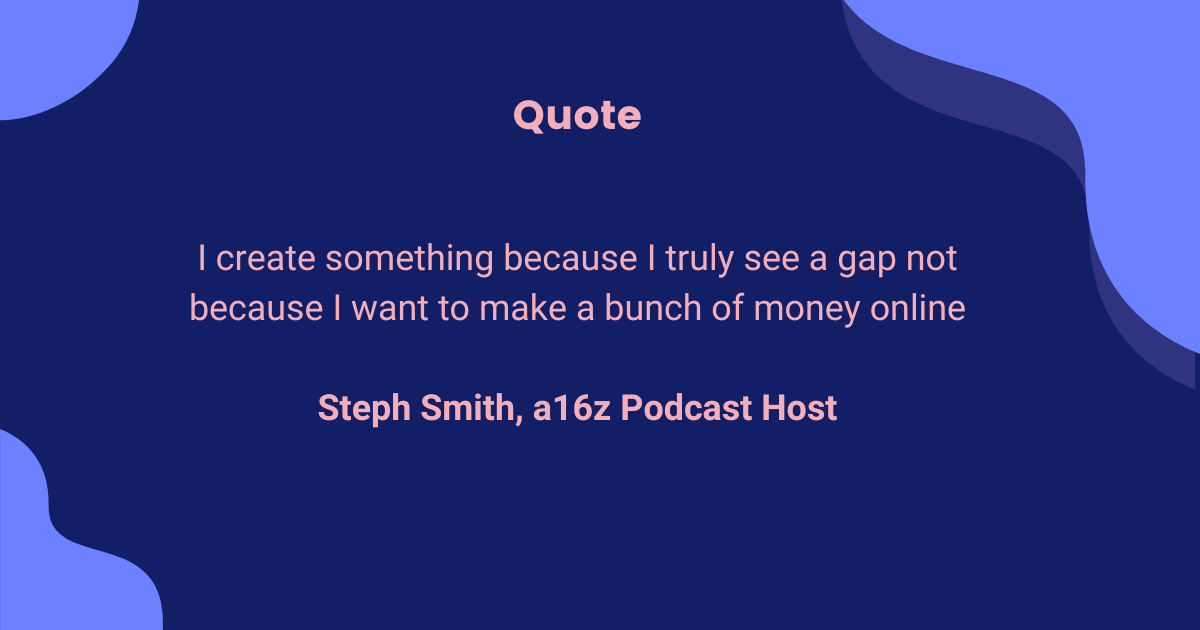
Thoughtful/intentional: One thing I always hope comes through in my work is that it's thoughtful. And what I mean by thoughtful is that when I create something, it's because I really want to create it, but I also do it as best I can and don’t sacrifice elements of it to get more of a following or more sales. An example is my book, Doing Content Right – I’ve never run ads for it and never promoted it in ways that I think are sleazy.
Transparent: When I learn something …, I will most likely share it, whether it's through tweeting or writing articles or podcasting ... like when I was learning to code and learned a new way to integrate with the Google API. I knew that was something that maybe some fraction of the world wanted to know. And so I would take the time to write that up and have done something similar hundreds of times now, including how I built my open page. I think I'm more transparent relative to at least the average creator, because I see the space as positive-sum.
Q: Something interesting you mentioned is experimentation as a way to evolve a personal brand — can you elaborate on that?
If you look at the creators that have sustained their audiences over time, they've had to reinvent many times over. Putting enough versions of yourself out there, as strange as it sounds, means there are more chances people will latch onto something.
It's almost like a startup. A startup must continue iterating, experimenting, and putting different versions of its product out there. And what they can't control is ultimately what the market wants. But they can create enough versions or run enough tests to give themselves enough opportunities to find product-market fit.
Q: Continuing with this theme of experimentation, what are moments in your professional journey when you've had to evolve or iterate on what you thought your personal brand was going to be?
Yeah, I can call out several points along [my journey]. When I started in the workforce, I had to pivot because I did my degree in chemical engineering. But then, the available jobs weren't the ones I wanted to do; most were in oil and gas. So that was the first evolution – even though I viewed myself as an engineer and put all this work into this degree, I had to do something new.
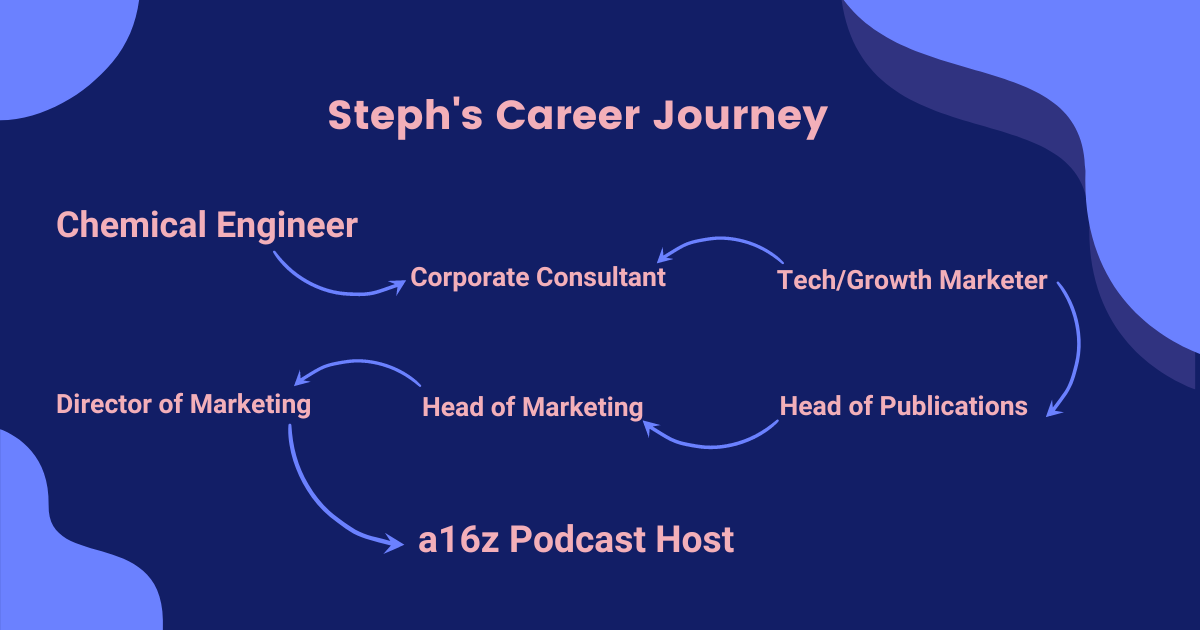
I went into consulting and had a clear path of action there, but then I wanted to be remote. So I had to reinvent myself again, which luckily led me into tech and created an interesting inflection point, where I was asked to lead a publications team. And it's not so much that I don't like being branded as a content person, but I had this reaction of “I don't lead publications teams… that's not what I do.” But I ended up doing it, and it was a great decision.
I had to allow myself to become someone I had never considered being. - Steph Smith, a16z Podcast Host
That was another example where I had to allow myself to become someone that I never considered being. That period is when I started coding and creating content online. I was creating indie products through code, which I thought would be my “thing” – an identity as a woman in tech, and I even started writing about that. But then I started writing about writing; writing about content.
There have been many evolutions where I've had to, you could say from an outside perspective, rebrand myself. But internally, as corny as it sounds, it was just about following what I was interested in at the time and what opportunities fell on my plate.
Now, I've tried to dissociate more from my identity and how I view myself, and instead focus on what interests me at the time because now, becoming a full-time podcaster, I could have never predicted that. That was yet another phase change, where I had to shed what I was before to start something new … I think now it's come more easily because I just view myself as a multi-hyphenate.
Q: So, as a multi-hyphenate, you’ve done a lot of work in podcast hosting, coding, and writing. A common thread is how much passion and effort shine through in each project. Do you see your projects as a vehicle for growing your personal brand? And how do you connect these efforts to each other to craft the image people have of you?
Yes, everything I do will relate to my personal brand, some more than others. I can’t help that. There are things that reach many people and will be most impactful. But every little bit contributes, so I try to do my best no matter the situation, whether I’m starring on someone’s podcast or releasing a book or something much “smaller”.
Everything I do, whether I like it or not, relates to my personal brand and is a vehicle for it. But ultimately, what drives that vehicle, good or bad, is how I perform in every one of those circumstances. And hopefully, it's more positive than negative.
Again, you can't always control what people think about your work, but you can sway the way people see your personal brand through the projects you pursue and how you pursue them. This is why I think many creators find themselves on the slippery slope I mentioned earlier. If the quality of your work doesn’t match your audience’s expectations and seems like a money grab, you’ve harmed your personal brand and that trust is hard to win back.
Q: I’d like to dive into something that’s an essential part of this series — the place of social media in developing a personal brand. You’re super active on Twitter — would you say that’s the main platform you’ve used to grow your online presence?
Twitter has been the main platform for growing my online presence, and the “why” behind that is pretty simple – that's where I enjoy spending the most time, and creating content there is easier for me than creating content on other platforms.
I do want to explore more platforms because I am quite concentrated on Twitter. But I also have to consider a simple content marketing question, “Where's my audience?” If I'm talking about technology, there's a lot of content around that on TikTok, so that’s an example of a platform that I'm debating venturing into.
Q: Has growing an online presence using social media, specifically Twitter, helped your career?
When I learned to code in 2018, I was not active on Twitter, so I ended up wiping my account and starting with zero followers. No one knew who I was nor why I might be interesting.
And from where I am today, I can confidently say that several of my recent roles have come through (or at least been heavily supported by) my presence on social media or my personal projects, not my official resume. One example of this is how I joined The Hustle. Sam, the founder, saw an article that I had written, which went viral on Hacker News and was shared by a well-known VC. By that point, I think I maybe had about three thousand followers. That's how he discovered my work, which led me to The Hustle, which was later acquired by HubSpot.
Q: Since you have experience cleaning the slate and starting anew on a social media platform, what would you recommend that people with zero to minimal presence on social media do when thinking about how to use theirs to grow a personal brand?
If I was just starting out, I would figure out what I'm most interested in right now and double down on that. I would share everything I'm learning in that capacity and become known as someone uniquely interested in that space. And then, once you build a little bit of a following, you have the freedom to diversify and focus on other things, as I've done.
This may be counterintuitive to everything I’ve said about experimentation and evolution as a way to grow your personal brand, but it’s essential at the beginning of your journey to plant one seed and nurture it.
Q: Before we wrap up, do you have any final thoughts to share?
Millions of people create content, so it’s essential that you find a niche and give people a reason to follow you among the sea of others. One key way to approach this is through the topics you talk about.
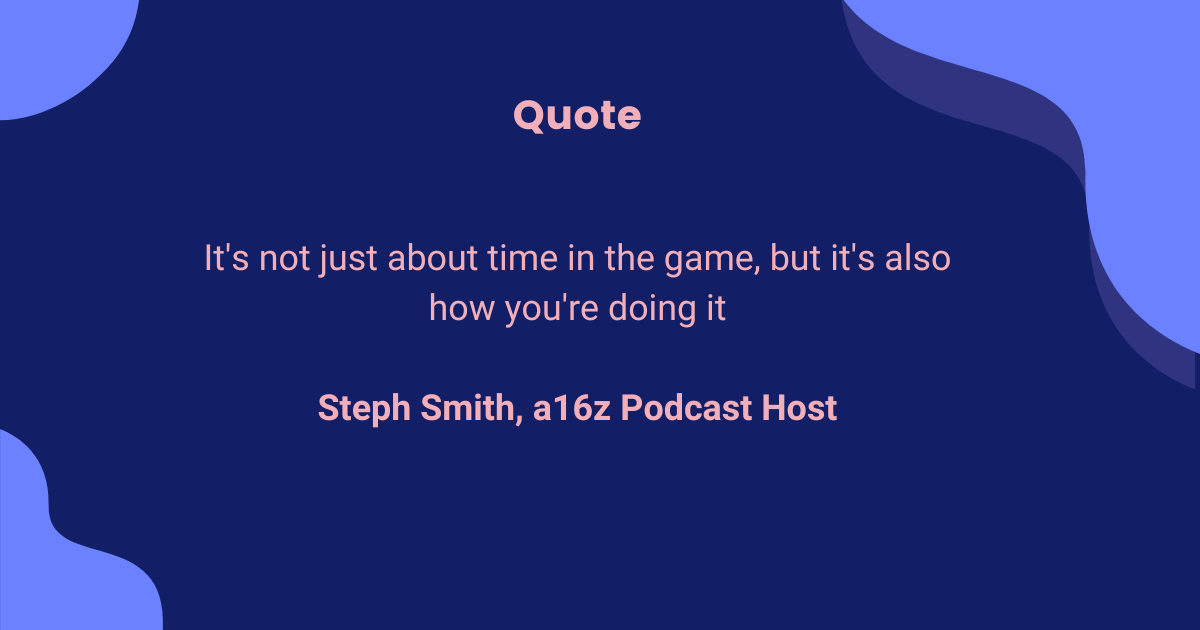
Another way many people miss, which can be just as effective, is how you talk about a topic. For example, there are tons of people who write about technology every day. But there are certain influencers, many who are newer, that do it better. They might be funnier, more contrarian, more visual, etc. So it's not just about time in the game but also how you're doing it.
Takeaways
Here are some ways to implement Steph’s personal brand-building tactics for your journey:
- Be intentional about building your personal brand: No matter what you choose to do to grow your brand and online presence, always bring your best self. Prepare for speaking engagements, create quality content, and treat every project as an extension of you. Transparency is a great way to stay intentional about your goals, and Steph has a lot of experience with both as she grew her Twitter by sharing her coding journey and indie projects. Check out this article for ideas of how to practice transparency as a way to stay intentional.
- Don’t be afraid to experiment: A big theme of Steph’s journey has been experimentation. Try different content formats, tackle new topics, and create for different platforms to find what works best for you. When it comes to trying new things, the small businesses in this article have their strategy down pat.
- Double down on one area: When you’re just starting out creating content for your personal brand, it’s important to become known for something. This helps you build expertise and credibility, and gives your potential audience something to latch on to. To figure out the balancing act of experimenting without tackling too many things at once – and at the risk of sounding repetitive – time in the game is less important than how you’re doing your work. If you take a new approach to your chosen field or topic, you can win people over or at least make them curious. For some inspiration, check out this article on interesting TikTok creators.
- Be open to new experiences: Steph mentioned being wary about taking on a role as head of publications because she’d never done it before but chose to forge ahead anyway. If you want to accelerate the growth of your personal brand, it’s important to be open to new challenges when they come. Putting yourself and your work out there can feel scary, but it can be very rewarding. Check out this article for ways you can open up new experiences for yourself using your online presence.
🔌Once you’re ready to start sharing content to your social channels, check out Buffer for easy automated scheduling and publishing!
Try Buffer for free
180,000+ creators, small businesses, and marketers use Buffer to grow their audiences every month.
Related Articles

In this article, you'll find 20+ essential LinkedIn statistics that reveal the platform's reach, effectiveness, and continued growth.
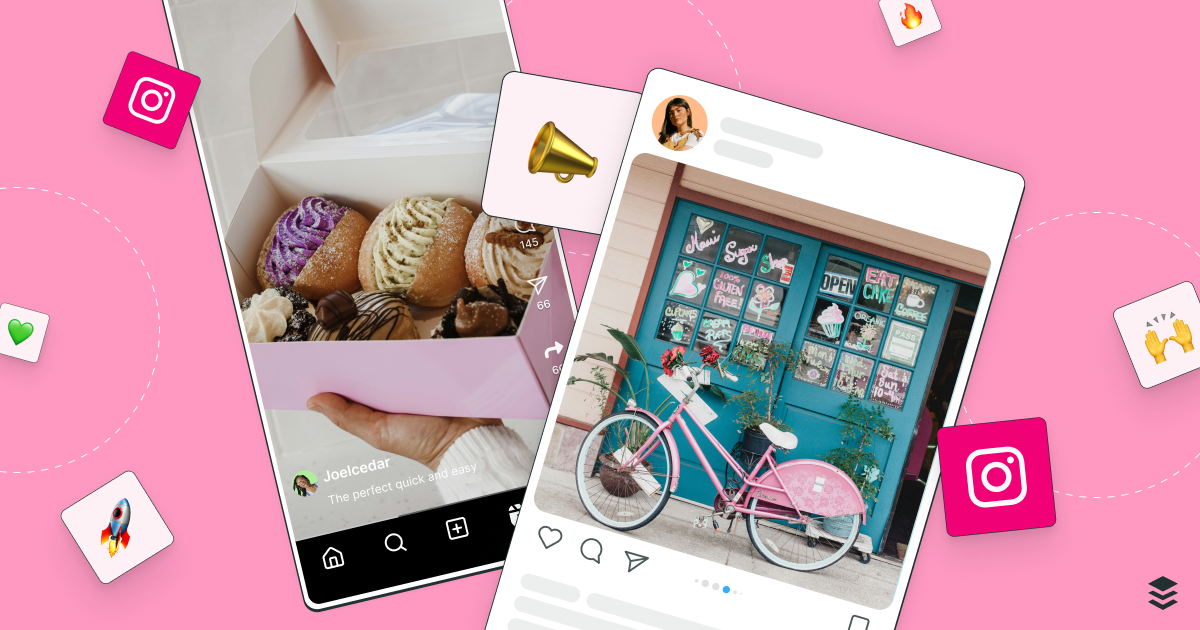
Learn the fundamentals and advanced principles of Instagram marketing — with examples, expert tips, and timely best practices.

The ins and outs of Instagram Stories, from getting started to advanced strategies that will make your stories stand out on Instagram.